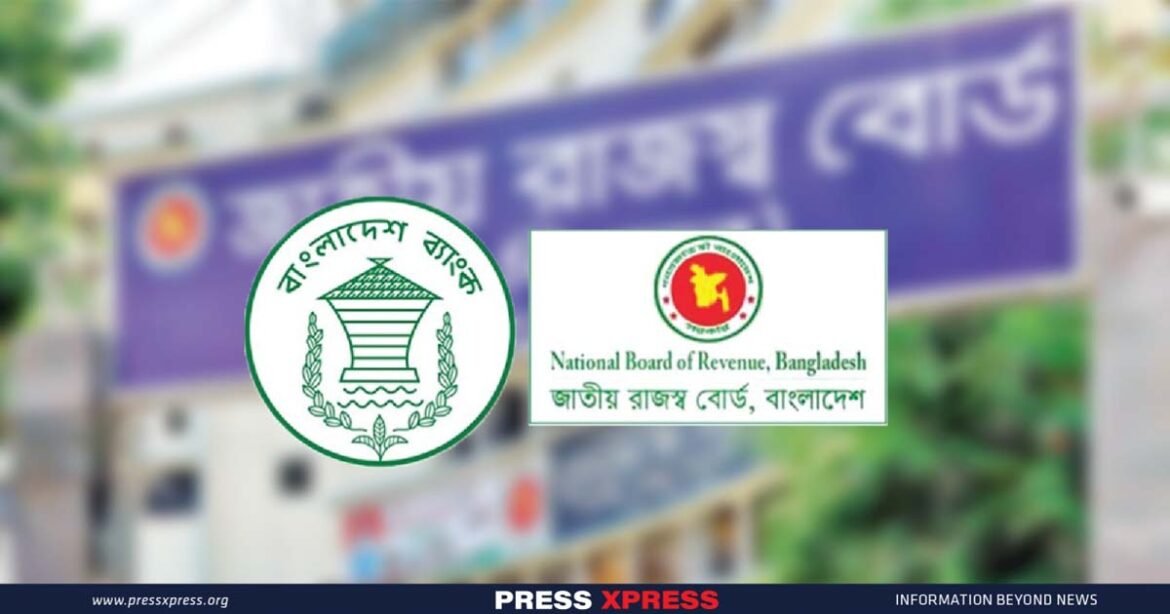The central bank also expressed concern that interest rates on foreign loans have already peaked, and the newly introduced tax will only exacerbate the costliness of these loans.
The Bangladesh Bank has officially urged the National Board of Revenue (NBR) to review the 20% ‘withholding tax’ imposed on interest payments for foreign loans in the current budget. They contend that this tax would raise the borrowing expenses from foreign sources by a quarter.
In a letter dated August 31st, the central bank emphasizes that foreign loan interest rates have already reached their peak and that the newly imposed tax exacerbates the costs of these loans.
You Can Also Read: WHY WORLD BANK HAS APPROVED $200M LOAN TO BANGLADESH?
The central bank’s communication highlights that the NBR had previously exempted foreign loan interest from taxation, as per a circular issued on November 29, 1976. Unfortunately, this advantageous provision was revoked through a circular issued on May 23 of this year.
Bangladesh Bank warns of 20% tax on foreign loans
Consequently, interest payments on foreign loans obtained by local banks’ offshore banking units and buyers’ credit have now become subject to a 20% tax at the source. The Bangladesh Bank said that, ultimately, it is the borrowers who will bear these additional costs, not the foreign lenders. Thus, when calculated on a gross-up basis, the effective tax rate significantly rises to 25%.
The central bank also expressed concern that interest rates on foreign loans have already peaked, and the newly introduced tax will only exacerbate the costliness of these loans. The Bangladesh Bank’s communication further highlights that this situation could discourage offshore banking units, corporations, and importers from seeking foreign loans, potentially placing pressure on liquidity and the exchange rate.

Bangladesh central bank urges for tax reconsideration
Md Mezbaul Haque, spokesperson for the Bangladesh Bank, revealed that they have taken action following a warning from the Association of Bankers, Bangladesh, a coalition of bank CEOs, regarding the challenges posed by the imposition of taxes on foreign loans.
‘In response to this concern,’ Mezbaul stated, ‘the central bank has formally reached out to the NBR, highlighting the difficulties that banks are encountering in securing foreign loans. We have officially requested the NBR to reconsider and revoke the tax.’
He also pointed out that a decrease in the availability of foreign loans would have adverse effects on the country’s financial account and current account balance, both of which are currently in a negative position.
According to an anonymous NBR official, the NBR is currently revising the central bank’s letter. The final call on whether to eliminate or lessen the 20% tax lies with the chairman and the finance ministry, as per the official who requested anonymity due to media restrictions.
Why are banks and businesses concerned?
Businesses and financial institutions have voiced concerns over the impact of the tax, warning that it could severely disrupt the growth of the industrial sector. Many entrepreneurs have come to rely on these affordable loans to fuel their business expansions.
Take, for example, Viyellatex Group, one of Bangladesh’s prominent textile and apparel manufacturers and exporters. They used to secure foreign currency loans directly from international development finance institutions to meet their foreign currency demands and expand their business operations.
‘We resort to foreign loans because obtaining dollars within the country is challenging,’ explained KM Rezaul Hasanat, the chairman and CEO of Viyellatex Group.
In the current scenario, with approximately $5 million left unpaid on his foreign loans, he vehemently criticized the abrupt tax imposition, underscoring the insufficient time afforded to businesses for adjustment.
According to him, such unforeseen tax measures erode the confidence of foreign investors, who typically rely on loans from parent companies and foreign lenders to sustain their operations.
DBL Group, a conglomerate involved in textiles, garments, ceramics, and pharmaceuticals, has witnessed substantial growth in the last decade, largely fueled by low-cost foreign loans obtained from institutions like the International Finance Corporation (IFC) and British International Investment, among others.
However, the group, which secured $96 million in loans from international development finance institutions just last year, has expressed reservations about continuing to acquire such loans in light of the new tax imposition.

How this tax measure hikes costs?
Interest rates in the global market are now linked to the Secured Overnight Financing Rate (SOFR), replacing the previous LIBOR benchmark. Foreign loans come with an additional interest margin of up to 3.5%. Due to the recent increase in US Federal Reserve rates, SOFR has jumped to 5.31% as of September 9, up from its pandemic low of 0.25%. This has resulted in higher international loan interest rates.
To illustrate, if you take out a $2 million one-year loan through buyer’s credit or offshore banking units, you would now face approximately $180,000 in interest charges. Additionally, due to the new withholding tax, borrowers are confronted with around Tk39 lakh in taxes related to interest payments. While foreign companies used to cover this tax, it is now being passed on to borrowers. Even loans from five years ago, along with their accumulated interest, are subject to this tax.
Prior to the tax implementation, Bangladeshi borrowers could secure international loans at a maximum interest rate of 8% or even less, in contrast to a minimum of 9% for local loans. However, dollar-denominated overseas loans now carry an interest rate of nearly 11%, surpassing the 10.10% rate for local loans.
Bankers are concerned that this tax will discourage dollar borrowing, potentially leading to a decline in foreign exchange reserves, which are already dwindling below $23 billion.


